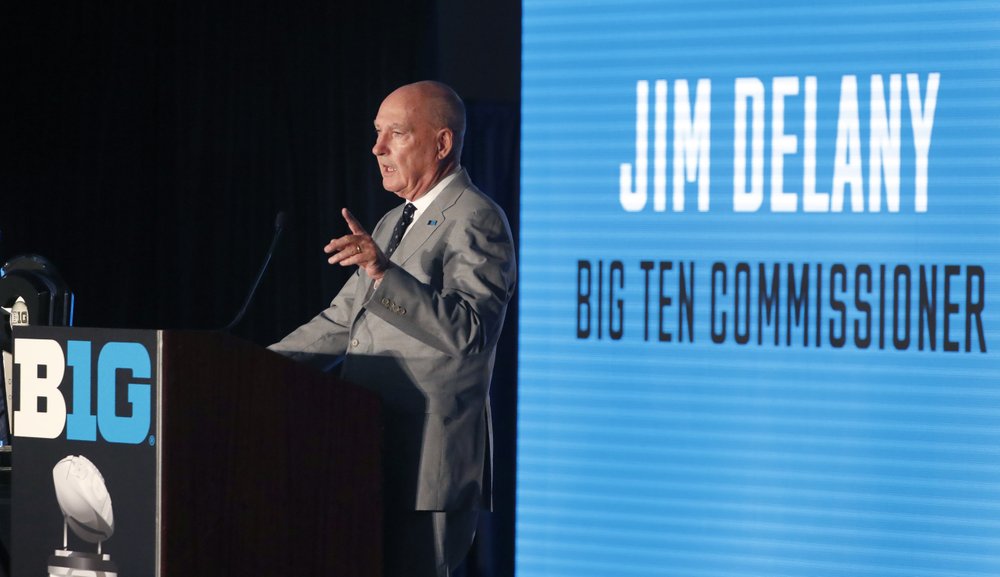
ROSEMONT, Ill. (AP) — Big Ten Commissioner Jim Delany would just as soon leave the paychecks to the pros. The conference’s coaches and players have different takes.
The amateur model of college athletics could be shaken to its core after once California’s Fair Pay to Play Act takes effect in a few years, requiring schools to allow athletes to profit from their names, images and likenesses through things such as endorsement deals or autograph signings. All are against current NCAA rules.
The issue was front and center at the Big Ten’s annual basketball media day. Some coaches said they see the move as a step in the right direction. Others voiced some concerns while insisting they’re in favor of improving conditions. Players seem to be all for it.
As for the conference’s commissioner?
“My view is that there may be some players who are ready for the professional ranks, but that’s not for the college ranks,” said Delany, who is retiring Jan. 1. “I would like to see players who are ready for the professional ranks to be able to access the professional game either through the G-League or I’d like to see the owners and unions open opportunities for young players as they have in baseball. Same thing about the NFL. We’re not the minor leagues.”
Delany called it a “slippery slope” and seemed relieved he won’t have to deal with the issue.
“We’re involved in an enterprise that touches maybe 100,000 players, so maybe there’s 1% or 2% that may have commercial value, but I would prefer they have the choice to move that into the professional ranks,” he said
NBA Commissioner Adam Silver has said the league is ready to scrap the rule requiring players to wait a year out of high school before entering the draft. The change is likely to be in place by 2022. The NFL requires players to be at least three years removed from high school. Underclassmen can apply for approval from the league to enter the draft.
The law passed by California raises all sorts of possibilities _ and questions. It takes effect in 2023. Other states are considering similar legislation. And a major shift could be coming to the college landscape; the NCAA has a working group studying the issue with recommendations expected this fall.
Some coaches called the law a welcome change.
“I do think (players) should be able to profit off their individual brand,” Minnesota’s Richard Pitino said. “If they’re profiting off their individual brand, that means we’re winning. That means they’re getting better. I think everybody wins in it.”
New Nebraska coach Fred Hoiberg called it “progress.” He said he would have “loved” to be compensated back when he was starring for his hometown team, Iowa State.
“I think that would’ve been a pretty good deal for a guy like me,” he said.
Hoiberg joked he probably would have made “a couple hundred bucks.” But for today’s star players, the potential for big profits could be there.
That’s one reason Michigan State coach Tom Izzo is a bit skeptical.
“I don’t know what it’ll be like to be on a team if some guy is doing this and some guy is getting nothing,” he said. “I don’t know what that does to the chemistry.”
Then again, Penn State star Lamar Stevens said that could be good preparation for the NBA. After all, not everyone makes a max salary.
“You see so many people wearing your jersey or somehow having your face out there to promote their business and they’re making money off of you,” he said. “I think it’s only right that college athletes are able to benefit from that, because a lot of college athletes come to school and don’t have anything. Their families don’t have anything.”
Michigan State All-America guard Cassius Winston said it “would be nice” for players to be paid for their likeness.
“You see your name in places, posters, T-shirts,” the reigning Big Ten Player of the Year said. “It would be nice to be paid for it. But’s not like we’re complaining that we’re not.”
NCAA members have passed legislation in recent years increasing the value of an athletic scholarship to include the federally regulated true cost of attending a school, providing unlimited meals for college athletes and putting more defined restrictions on the amount of time coaches can require players to take part in team activities.
The law signed in California and those being considered by other states take the compensation issue to a different level. Izzo wondered why politicians are getting involved, saying he’s “baffled by that a little bit.” Pitino said if it takes a nudge from the government to “get the NCAA on board,” so be it.
One thing they all seemed to agree on: There needs to be a national standard _ not different rules for different states.
“I think what we all want is just an even playing field when it’s all said and done,” Maryland’s Mark Turgeon said. “I know it’s going to be a process, and so it’ll be interesting to see what happens over the next three or four years.”
More AP college basketball: https://apnews.com/Collegebasketball and https://twitter.com/AP_Top25










